Please, don’t be a Covidiot
Monday, Apr 6, 2020 - Posted by Rich Miller
* Rep. Brad Halbrook on Facebook…
* A commenter on the Rend Lake Visitor Center’s Facebook page asked a few days ago if people can still fish at the lake. The center’s response…
Yes. If you are using a boat, the South Marcum, Dam West, and Cypress View boat ramps are open. The North Gun Creek Boat Ramp, managed by the Rend Lake Conservancy District, which is where the Buck and Bass Cabins are is also open. This ramp is located north of Hwy 154, across from the Rend Lake Golf Course and just west of the I57 Sesser exit. If you are interested in fishing from the shoreline, all the hunter/fisherman parking lots managed by the Corps of Engineers, the Spillway recreation area, and the Dam West recreation area are all open at this time.
…Adding… Alton Telegraph…
Alton Mayor Brant Walker on Monday described his wife, Shannon Walker’s decision to attend a gathering at an Alton bar that was ultimately shut down by police as “a stunning lack of judgment.”
Brant Walker issued the statement soon after Alton Police Chief Jason “Jake” Simmons reported that officers broke up the party at Hiram’s Tavern, 213 W. 3rd St. in Alton at approximately 1 a.m. Sunday.
Simmons said a criminal complaint of reckless conduct will be filed against each person at the party for violating the state’s State At Home order amid the coronavirus pandemic.
Brant Walker says he instructed Simmons to not give his wife any special treatment.
36 Comments  
|
* Gov. Pritzker at today’s media briefing…
The shipments that we’ve received from the Strategic National Stockpile is a mere fraction of what we’ve asked for. 367,795 masks. 1,141,000 surgical masks. Nearly 693,000 gloves. 174,000 face shields, 142,000 surgical gowns and 4000 coveralls. Again, this is a small fraction of what we need. And what we have asked for. […]
Right now, we’re looking at a statewide 10-day PPE burn rate of just under 1.5 million N95 masks, 25 million gloves, 4.4 million gowns and 700,000 surgical masks.
And that’s just across our hospitals and long term care facilities, with small set-asides for our law enforcement to make sure that they are fully covered, and our essential state workers. That’s also before you count the McCormick Place alternate facility, which we project could bring our surgical mask burn rate to over 2 million across that 10 day period, to just offer one more example.
As you can see when you compare our federal shipments to our burn rate, the product that we’ve received from the federal stockpile will last only a handful of days in this multi month battle.
Please pardon all typos.
* On to questions for the governor. Dr. Deborah Birx at the White House as been saying no grocery store for the next two weeks, nothing, stay home completely. Should Illinoisans follow that advice?…
I have not heard her say that, but I understand exactly what she’s saying, that if you can stock up, and we’ve talked about this before when we did the stay at home order to begin with, that people should try to stock up for a period of time, 14 days, if they can certainly. The less interaction that people have over an extended period of time, the more likely it is that we’re going to be bending this curve
* Considering a curfew, whether that be shortening the hours of some of these essential businesses, you know, only one person per household?…
Yes, I would. I mean, the answer is we try to look at all of these things all the time where you know you’re want to balance people’s civil liberties and and our need to be able to stay at home and to defeat this virus. […]
There are lots of things that we can do to limit peoples’ gathering and conveying this virus to one another, and we of course are considering them all the time.
* The White House has sent 450 ventilators. The state has requested more than 4000. Where are you going to get the ventilators you need?…
So we’re, day in and day out, we are on the phone with companies that have ventilators and companies that could provide ventilators to us from that manufacturer. I’ve been on the phone with the head of Ford Motor Company, which is about to come out with their version of a ventilator, with General Motors or at least the people who are coordinating the effort for General Motors to gather to get those ventilators. I’ve talked to the head of by air, a company that’s based here in Illinois that makes ventilators, so we’re doing everything we can. I’m just one person that’s been on the phone around ventilators. We’ve also collected up ventilators from places that you might not normally expect us to have one. There are dental offices sometimes just in the event that somebody has a problem, you know, it’s very unusual right but many dentists will keep a ventilator around anyway surges centers where elective surgeries had taken place, that are not open today right they all, many of the most of them had ventilators.
* Federal help staffing McCormick Place?…
We will be receiving some federal medical staff, it hasn’t been made clear that there’ll be in McCormick Place. But we were notified that in fact there are federal army and other military medical staff that will be made available to us in the state of Illinois, so I’m very pleased to hear that and as to where they’re going to be assigned we haven’t yet had that conversation.
* “Can I ask you about, it might seem silly, but there’s some criticism today to the mayor, for having a hairdresser come to her and giving her a haircut. What are you doing about a haircut? Have you had a haircut? What do you think folks should do who are not able to go to the hairdresser? They see the mayor has had a private haircut, and they’re upset”…
Well, I can’t speak to the situation of the mayor’s haircut, but I will say I have not had a haircut since before the stay at home rule was put in place. I actually feel like I’m getting a little shaggy, I’m going to turn into a hippie at some point here. My hair grows pretty fast, so maybe I’ll learn how to use a flowbee or something else to cut my own hair. But look I mean these are some of the consequences that I think we’re all having to experience I know that they’re things that people might normally buy makeup that you might go to a makeup counter somewhere to get that you can’t get any more, because those stores are closed. […]
But, you know, everybody’s making sacrifices here and I’m sure that whatever the mayor did she did in a way that is safe for everybody and for her for the people who may have, you know, done. You know, dressing her hair you know doing her haircut.
* Governor, you said at least twice ,the last time on March 5, that the risk to the general public remains low. Why did you say that, and what were you basing that, when did you change your mind?…
Well I was listening to the CDC. And what I heard from the CDC was that the risk to the general public was low. And I think the CDC is a terrific organization mostly has gotten things right over the many years that I’ve been alive. And so I believed what they were saying and I was repeating that I think I still think it’s a great organization I think that for whatever reason at the federal government level I think perhaps decisions being made at the White House. They weren’t giving very strong advice about what to do, proactively to address cobit 19. But as you know, we took early actions without the CDC, and I’m hoping and praying that those actions are, you know, delivering good results for the state of Illinois.
* What steps are being taken to shore up state spending in anticipation of the crater of state revenues? Is your administration implementing any cutback of services or staff reductions?…
First of all, this is, I mean it’s unprecedented in terms of the state even compared to 2008-2009, the revenue shortfall, the things that we’re having to do to address this, you know is creating a gap that I don’t think anybody could have anticipated. So we are looking very hard at what we need to do to to get the revenues and expenditures in line with one another. I think a lot of it is going to depend upon the federal government I mean there’s just no one else who can step in the, you know, to help our state finances, the way that the federal government can.
* With African-Americans representing a disproportionate number of COVID 19 fatalities, what plan does the administration have to attack this problem? Any theory about why blacks are being hit harder?…
There was a rumor, also very false, that African Americans were, I read this recently in a, in a serious publication, that the there was a rumor that African Americans were immune. And I hope people didn’t read that, or understand that but that is a rumor that was put out on social media. And so that obviously is false.
The flipside is also false that this this adversely affects African Americans, because COVID 19 by its very nature has some disproportionate effect on the African American populaetion. Here’s the reason that we think that it has a disproportionate effect on the African American community, things that Dr. Ezike was saying, underlying conditions that exists, the poor health care that has been provided you know because of years of disinvestment in communities of color. Those have both come together, this virus has had this terrible effect on the African American community because of those two things when there are, you know, a large number of people in the African American community with diabetes and with hypertension. And those are comorbidities that can cause greater problems with COVID 19. Together with the idea that there aren’t the safety net hospitals are challenged in our state, and tthe availability of health care in communities of color has been at a lower quality or lower availability than in other communities so those have worked. So we are countering it both by reopening hospitals that are in those communities. You’ve seen us working on reopening those as well as by making sure that we’re messaging properly, we’re using social media, and our All in Illinois campaign to message directly into the African American community about stay at home about making sure that people are washing their hands, that they’re, you know, wiping down surfaces and all the other things that we’ve asked people to do.
* What are your thoughts about Illinoisans still planning to travel Wednesday to celebrate Passover this weekend to celebrate Easter. You’ve clearly discouraged residents to stay home and maintain social distancing, but do you have a specific message for those wanting to celebrate with their family anyway? Will there be any sort of enforcement mechanism to ensure there is no needless travel in the coming weeks?…
Look, I understand the desire to worship. Passover is coming up. We’re in Easter week.
This is an important holy time of the year. And I want very much for people to experience the spirituality that they normally would. We live in a very difficult time. And I would suggest that, unfortunately, where we all should start to think about how we’re going to use technology in order for us to gather in order to hear our pastor or a rabbi, you know, or a imam or whoever we worship with, you know, to listen to them and to worship online perhaps by video or by phone, and to connect with family in the same way.
It’s very important if your family doesn’t live with you and you normally would get together for the holidays. This is a time when you’ve got to look for another way to do it. I’ve heard people using zoom. There’s a funny term I’ve heard for Passover Seder as a Seder zoom Seder. And I think that we’re all going to be experiencing the holidays in a very unusual ways this year but it’s very important. I cannot reiterate this enough. It is very important that you stay home. It is very important that you do not gather in a place of worship or in somebody’s home with you know with other families or even with your family if they don’t live with you. It’s, we’ve got to protect each other and this will not last forever, but this is one Easter, one Passover that you’re going to have to do something unusual on the way that your worship and I asked you please do that for all of us.
* You said last week that you’d exhausted nearly every step at the state level to slow COVID 19 spread. On Sunday, you mentioned some other measures such as temperature checks. When would those steps become necessary?…
I think what we’re trying to do is, again, keep it balanced. This question was asked a little bit earlier, there’s a balance between, trying not to impose on everybody’s civil liberties, and at the same time trying to defeat this virus. And so, evaluating that every day, and I think the triggers would be if people are just not living by the rules, we’d have to enforce them to a greater extent.
You know, especially around the holidays here, nobody wants to have police patrolling the parking lots of churches, or synagogues or mosques to break people up. It’s not right. It’s not fair to the police officers either.
And we just, we all need, we are in this together, we all need to step up and do the right thing even if this time of year especially at this time of year.
23 Comments  
|
* ProPublica Illinois today…
Five months ago, when Illinois schools Superintendent Carmen Ayala learned students were being repeatedly shut inside small rooms alone as punishment and physically held down on the floor, she said she cried. She vowed it would never happen again.
But Illinois State Board of Education officials negotiated with a key legislative rule-making committee to allow schools to use prone restraint for one more school year, aiming to phase out its use by July 2021. The decision last week came after a few small schools — including one whose advisory board includes state lawmakers — mounted letter-writing campaigns and direct appeals to government leaders.
State education board members already had relaxed the emergency ban that prevented children from being secluded by themselves, though with clearer direction on when isolated timeouts can and can’t be used and, for the first time, state oversight. The board, however, had remained firm on not allowing face-down, or prone, floor restraints because they are too dangerous.
That last sentence is not true.
* How do I know it’s not true? From ProPublica Illinois this past December…
Illinois Will Allow Prone, Supine Restraints on Children While Schools Learn to Phase Them Out
Amending emergency rules put in place two weeks ago, the Illinois State Board of Education says it will again allow schoolchildren to be physically restrained in positions it had banned, though only in crisis situations.
All JCAR did last week was extend those amended emergency rules from last December. The emergency rules covered quiet rooms and physical restraint.
* Hannah Meisel at the Daily Line thoroughly covered last week’s meeting…
The commission, known as JCAR, meets monthly to approve rules written by state agencies and boards in order to implement newly passed state laws. Often, before JCAR is able to take final action on rules, emergency rules will be written that can last up to several months.
One of the most pressing set of emergency rules JCAR needed to vote to extend were ones approved by the Illinois State Board of Education in November after Tribune/ProPublica Illinois investigation into the use and potential abuse of isolation rooms in school settings for children who are deemed disruptive in classroom settings. The new rules prohibit the use of locked seclusion rooms and stop schools from using prone restraint.
Cunningham said though the emergency rules would expire while school was still out of session in Illinois due to Pritzker’s executive order shuttering schools to prevent the spread of coronavirus, also known as Covid-19, the rule was still important to have in place for special education students who have been moved to out-of-state boarding schools better equipped to handle their needs. Some of those schools are still in session. […]
Beyond those special education students at out-of-state facilities, Cunningham said that if school was resumed statewide in a month or further down the road, without JCAR having met to extend the emergency rules on isolation rooms, it would “become a complicated legal question.”
“We would open things up to all sorts of legal debate about us renewing a rule after it was already expired,” Cunningham said. “Do we have ability to extend a rule that already expired?”
*** UPDATE *** ISBE…
Hi Rich,
I am sending some information for your post on the recent ProPublica story on prone restraint: https://capitolfax.com/2020/04/06/am-i-missing-something-here/.
Following weeks of conversations, it became clear that it would not be possible to move forward with a ban on the use of prone restraint via rulemaking at this time. JCAR informed ISBE that if a one-year extension on the practice was not accepted, a filing prohibition for this section would be under serious consideration by members. ISBE agreed to this one-year extension on the use of prone restraint in very narrow circumstances to allow schools more time to transition to less restrictive techniques.
ISBE looks forward to continued talks with members of JCAR and with members of the General Assembly regarding the agency’s concerns with the use of prone restraint. ISBE will fully support legislation to ban prone restraint.
Thank you,
Jackie
Jackie Matthews
Director of External Communications
Illinois State Board of Education
8 Comments  
|
|
Comments Off  
|
* Maria Ines Zamudio and Elliott Ramos…
The COVID-19 virus is killing black residents in Cook County at disproportionately high rates, according to early data analyzed by WBEZ.
While black residents make up only 23% of the population in the county, they account for 58% of the COVID-19 deaths. And half of the deceased lived in Chicago, according to data from the Cook County Medical Examiner’s office.
As of Saturday, 107 of Cook County’s 183 deaths from COVID-19 were black. In Chicago, 61 of the 86 recorded deaths – or 70% – were black residents. Blacks make up 29% of Chicago’s population.
The majority of the black COVID-19 patients who died had underlying health conditions including respiratory problems and diabetes. Eighty-one percent of them had hypertension, or high blood pressure, diabetes or both. […]
“It’s disturbing and upsetting, but not surprising,” said Dr. Linda Rae Murray, health policy professor at the University of Illinois at Chicago. “This is just a reflection of the facts that we already know about these pandemics. People who are vulnerable will die quicker and won’t have as many resources.”
Discuss.
*** UPDATE 1 *** Press release…
The following statement was issued by SEIU Healthcare Illinois Indiana president Greg Kelley in response to news of the disproportionately high number of African American victims of the coronavirus:
CHICAGO–”News that a disproportionate number of African Americans, particularly Black males, die as a result of the coronavirus disease is shocking, yet not surprising. For far too long, officials have talked about and planned strategies to address economic and health disparities that exist among African Americans. The current pandemic demonstrates the dismal impact of their efforts.
“As a Black male, these statistics further heighten my concern for our members. They are the predominantly African American healthcare workers who are undervalued members of the workforce without whom no medical delivery would be possible.
“The person who transports patients, does the laundry, cleans the patient or prepares the food, and more, is likely to be Black. These same “essential” workers – people prone to underlying health conditions – have to labor without proper protective equipment, fight for decent wages and many can’t afford health insurance at the institutions where they work.
“The coronavirus is a devastating disease that we must work together to overcome. The bigger disease is the one that continues to perpetuate these conditions in the African American community. Let’s declare racism as a pandemic and put forth the proper resources to address it.”
*** UPDATE 2 *** Better late than never, I suppose…
Calling it a “public health red alarm,” Mayor Lori Lightfoot pledged on Monday that her administration will unveil a plan to address the coronavirus’ toll on black and brown Chicagoans after data showed they were being hit especially hard by the disease.
About 70% of Chicagoans who have died from COVID-19 are African American, Lightfoot acknowledged.
“It’s devastating to see those numbers and knowing that they’re not just numbers, they’re lives, there’s families and communities that have been shattered,” Lightfoot said. “That’s why we will be announcing a very robust and immediate comprehensive plan to address this.”
24 Comments  
|
|
Comments Off  
|
[Comments are now open on this post.]
* Rep. Anne Stava-Murray on Facebook…
Hello all- this is likely to be my last update for a few days while I take some doctor mandated rest.
My doctors suspect I have COVID-19, which has triggered asthma for me (previously I’ve only had sports induced asthma) and puts me in an at risk category.
Due to the lack of available tests and my age; I will likely not be tested unless I need to be admitted to a hospital but am assumed to be positive based on my symptoms.
I want to take a moment to advocate for second opinions if you need them.
My first urgent care telehealth visit ended with potentially deadly advice about what qualifies as “bad enough” to go to the hospital.
The advice didn’t pass the “smell test” for me and sure enough when I got a second and third opinion, all other nurses and doctors confirmed that if I waited as long as they indicated, I would likely be unconscious and not able to be saved by the time I got to the hospital.
Now, hopefully my body will just kick this, but in the case that it doesn’t and I’m part of the 20% who need to be hospitalized, I’m grateful for those nurses and doctors who steered me into a safer course of action.
Please listen to your instincts and get another opinion if something doesn’t sit right with you about your first visit.
I am grateful that I have been extremely serious about social distancing (the last time I went anywhere was March 16 for a necessity from Home Depot), in that I don’t have on my conscience worrying about any others I may have unwittingly gotten ill.
Within my household, multiple family members are now showing signs so in addition to attempting to rest, I will also be helping (as I’m able) to take care of my children.
While I will not personally be available while I attempt to maintain a safe oxygen level above the one pictured here, my superstar chief off staff Kim will still be around to pass questions on to the Governor’s team as needed.
I can’t be 100 percent sure, but I think Rep. Stava-Murray is the first Illinois legislator to come forward with this sort of news.
5 Comments  
|
899 new cases, 31 additional deaths
Sunday, Apr 5, 2020 - Posted by Rich Miller
[Comments are now open on this post.]
* Press release…
The Illinois Department of Public Health (IDPH) today announced 899 new cases of coronavirus disease (COVID-19) in Illinois, including 31 additional deaths.
Cook County: 2 male 40’s, 3 female 50’s, 1 male 50’s, 1 female 60’s, 2 male 60’s, 2 female 70’s, 2 male 70’s, 4 female 80’s, 1 male 80’s, 1 female 90’s
DuPage County: 3 female 70’s, 1 female 80’s
Kane County: 1 male 70’s, 2 female 80’s
Kankakee County: 1 female 80’s
Lake County: 1 male 60’s
Montgomery: 1 male 50’s
Peoria: 1 male 90’s
Will: 1 male 60’s
Boone, Calhoun and Gallatin counties are now reporting cases. Currently, IDPH is reporting a total of 11,256 cases, including 274 deaths, in 71 counties in Illinois. The age of cases ranges from younger than one to older than 100 years.
…Adding… IDPH charts. Tests…
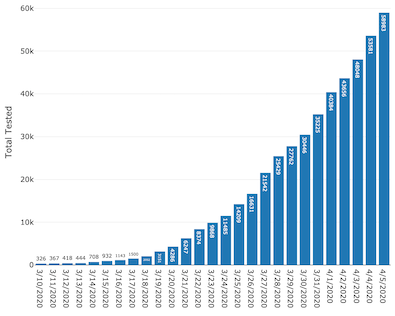
* Cases…
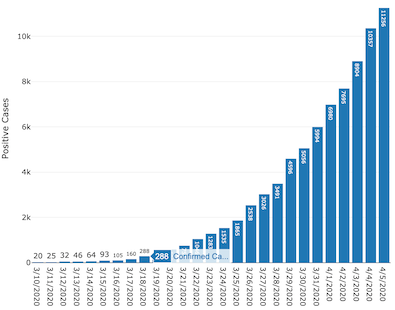
* Deaths…
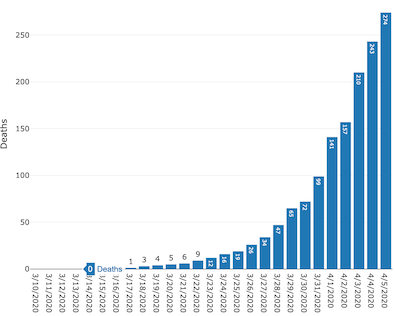
Comments Off  
|
[Comments are now open on this post.]
* At the start of today’s presser…
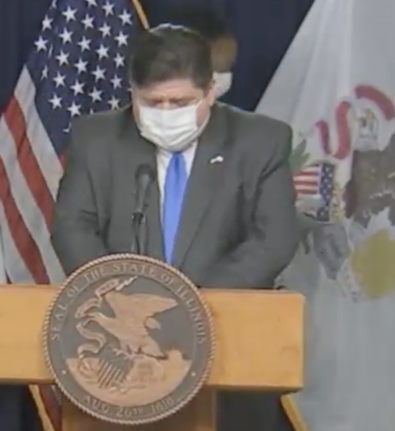
He removed the mask when he began speaking.
* The governor…
I’m proud that here in Illinois effective April 1, all essential workers in healthcare, Human Services, essential government services and essential infrastructure now qualify for the state’s childcare Assistance Program, meaning that the state will cover most if not all of the cost of care with our emergency childcare providers. That includes everyone from nurses and doctors, to support staff in hospitals, to grocery store clerks and food producers.
Again, please pardon all typos.
* More from the governor…
When our stay at home order first went into effect and traditional childcare centers temporarily closed, I announced a new emergency childcare center license for providers, interested organizations, and parents and guardians within communities to increase the availability of safe, small group care for the children of our essential workers.
As of this weekend over 550 centers are running under the emergency childcare permit. Additionally, over 1500 home childcare providers have reported that they’re still providing care, many of them on the critical night and weekend shifts that are so important for our essential workers. I cannot stress enough the difference that all of these providers are making in the lives of, not just the families that they serve but all Illinoisans
* Press release…
Full details and applications for assistance are available on the Department of Human Services (IDHS) website DHS.illinois.gov/helpishere and coronavirus.illinois.gov. […]
The state developed a simple waiver process to allow child care providers to be paid for all of their enrolled children in the Child Care Assistance Program for March and April so that child care staff could continue to receive pay through this crisis. The state also reduced parent co-payments in April and May to $1 per month to relieve cost burdens on parents and to make sure that providers don’t miss out on this important revenue.
In order to educate providers on the support available for small businesses in the federal CARES Act, GOECD is providing a webinar the morning of Monday, April 6 for providers. For more information, providers can visit www2.illinois.gov/sites/OECD/Pages/COVID-19.aspx.
* Pritzker talks about federal red tape…
Unfortunately, the Federal Headstart program has actually done the exact opposite, making it very difficult for Headstart programs to use their staff or facilities to respond to the needs of non Headstart families in their communities who may need care. I’ve urged the federal government to take a hard look at what we’re doing here in Illinois and reconsider how they’re operating Headstart until we get through this current crisis.
* Dr. Ezike…
Among those deaths is a second individual from the outbreak at Stateville prison. This individual was at a local hospital. There are currently 60 positive cases at this congregate facility.
* More from Dr. Ezike…
About 30% of positive cases are African-American. We know all too well that there are general disparities and health outcomes that play along these racial lines, and the same may be true for this virus.
* On to questions for the governor. The first couple were TV reporter softballs asking him to tee off on the feds, which he has done repeatedly. Not really news.
* The Surgeon General said that he expects this week to be like a pearl harbor like a 911 in America. Is that what you’re expecting?…
I guess I wouldn’t have used those words but this is, and I want to say that this is happening on a rolling basis in different areas of the country. So it’s not all happening at one time, everywhere, but it is all going to happen in a relatively short period of time, meaning perhaps over six to eight weeks across many areas of the country. And so, I do very much worry about all of the people of the United States and especially in areas, very highly urban areas where it’s where the virus is spreading fast, as well as you know the many people who live in rural exurban and suburban areas, who sometimes think that this isn’t coming to them, but you’ve seen, look at the map of the state of Illinois People, when there was one county that was being affected, people said it should never touch me. Now we’re at 70 counties out of 102, and I can almost guarantee you when we’re when we’re all said and done here, all 102 counties are going to have cases
* We’re getting a lot of questions from people who are confused, business owners who say are there rules in place and exactly what are the rules governing how a business should operate when they suspect that there might be COVID 19 cases within their workforces?…
…The rules are being written as we go here, I mean you’ve seen that we’ve had to evolve as we learn more and so we’re going to continue to try to set those rules, we’re going to continue to try to work with businesses with workers to make sure that things are done in the right way. But as I said yesterday, any businesses that are forcing their workers to come to work When they are ill. Those people, we’ve got to raise attention about that and we should go after them and make sure that businesses are doing the right thing.
* We’re still getting a lot of complaints from essential workers, specifically in healthcare about not having enough equipment. What would you tell someone in your family if they were involved in healthcare, and they’re not having the proper equipment to do their jobs and stay safe and protect their families?…
The equipment, by all of the measures that we use the, equipment exists at those health care facilities. And so if it’s not being provided to you by your employer, they haven’t, because we’ve checked on the stocks at every one of these healthcare institutions, they have the ability to call us anytime they’re running low in any way they can call their county public health boards to get PPE. We’ve been acquiring PPE and pushing it out to every county in the state of Illinois and directly sometimes to the hospitals. Here in the city of Chicago the city has a stockpile of its own PPE that it is responsible for pushing out to the hospitals in Chicago, and by all measures they have reported that every hospital has what it needs in the immediate term for every person that works in a healthcare facility. So if people are not getting it it’s not because it isn’t on site. And so they should insist with their supervisor or with higher ups at those healthcare organizations that they get the proper PPE. But I think we all know that they you know that if you’re treating COVID 19 patients and even if you’re not and perhaps in an adjacent Ward or something where you know you’re being exposed to COVID 19 patients in any way, but the PPE and E95 masks surgical masks other PPE that people can wear is, is exactly what we’ve provided there so it is available, they should wear it.
* Why isn’t Illinois putting tougher measures in place, like perhaps no one on the streets after 7pm or perhaps why not only one person per family, one day a week depending on the last name of that family, for example…
These are all measures that potentially could be put in place. There’s no doubt there are other things that we can do as well. You know in South Korea, just to give you one example, there, everybody that walks into a grocery store, before they walk in there, their temperature is taken. And when you came into this building your temperature was taken here at the State of Illinois building. That’s something that I think is a very interesting idea something that I’ve looked at and if considered.
And, you know, as we move along here you’ve seen we’ve tightened and tightened you know wherever we thought we could. So these ideas that that are being brought up by Erica Maldonado are perfectly good ideas. We could do those things.
I think what we’re seeing is people are, for the most part, the vast majority of people are abiding by our stay at home, they are doing the right things, but we will continue to look at what is possible what is likely, and how we would enforce those things.
* Could this pandemic or others come around again and this disruption of people’s lives and health would be every few years possibly?…
Well, there’s no doubt that, you know, a single virus pandemic even if we overcome it when we overcome it doesn’t mean that there couldn’t be another one.
* Are there any criteria or data points that could lead the governor to impose tighter restrictions than those that are currently in place and what might those look like, or is this literally all the state could do right now?…
Well, as indicated by an earlier question, there certainly are more things that could be done. […]
As I look at the potential for peaking in the next couple of weeks that we’ll be able to manage through this with the resources that we have. But I’m not fully confident of that and that’s why we spend every day trying to obtain more PPE trying to make sure we have more beds available to us (etc.)
* What are you doing to keep downstate legislators up to date on the decisions and impacting their constituents?…
I have a call with legislators across the state, one on Tuesday one on Friday. We talked to mayors, also other leaders, and I made sure to give them all the information that I have available to me so that they can better inform their constituents and they can help us, frankly, with the ideas that they have and they call every day, just so you know, have a staff, what is normally a legislative staff dealing with legislation that is taking calls from legislators and trying to answer questions that they have and for their constituents and you know we’re doing the best we can to get to everybody, every single day. I think we do a pretty good job of it.
* For Dr. Ezike: Does IDPH have any way to measure the mental health impact to them the millions who say they feel isolated? [That’s actually a function of IDHS, but whatevs]…
I think we know that that’s a significant issue. And I know when I talked to Secretary Hou agrees, Grace Hou of the Department of Health Services. We know that the work that’s going to have to be done between our agency and her agency will just be exponentially more in terms of the amount of mental health, decompensation, and amount of social services that will be needed. And so our agencies, of course, along with other sister agencies and so many agencies are already trying to mitigate some of the damage that’s being done. We know that we’ll continue to be working overtime not just now but even months and years after we get on the other side of this to kind of repair, so much that will be undone from the current situation.
* Pritzker was asked a question earlier about Iowa’s governor. He criticized governors for following the president’s lead and denying that this is a real problem. So he returned to the podium to make a final statement…
I think sometimes people mistake when I am being critical of the White House or the president, they mistake that for me being critical of the people are helping at the federal level.
The Army Corps of Engineers has done a superb job for the state of Illinois. The Army has come in and they’ve met with me, a number of times, they are putting their personnel forward, they’re working with our Illinois National Guard. We’re the best in the nation to make sure that we’re building out the facilities that we need to.
And FEMA, the FEMA officials that we deal with here in our region, and the HHS officials, all are working very hard. They live here in Illinois, most of them. And so they want this to succeed for them and for their families as well as for all of us.
So I am grateful for all of the help that we get from those federal employees who work day and night really to protect the people of Illinois. And so my criticism has been the lateness of the policies decisions that have been made by the leaders, and therefore the lateness of any help that we have gotten, which has been due to the people who are above the people that I just described, and their unwillingness to make good decisions that work to the to the betterment of everybody in Illinois.
-30-
Comments Off  
|
|
 Support CapitolFax.com
Support CapitolFax.com
Visit our advertisers...

 ...............
...............
 ...............
...............
 ...............
...............
 ...............
...............
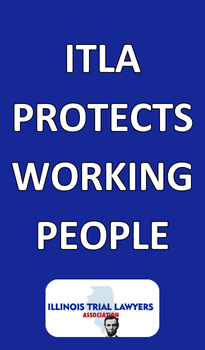 ...............
...............
 ...............
...............


|
   
|
Hosted by MCS
SUBSCRIBE to Capitol Fax
Advertise Here
Mobile Version
Contact Rich Miller
|



















